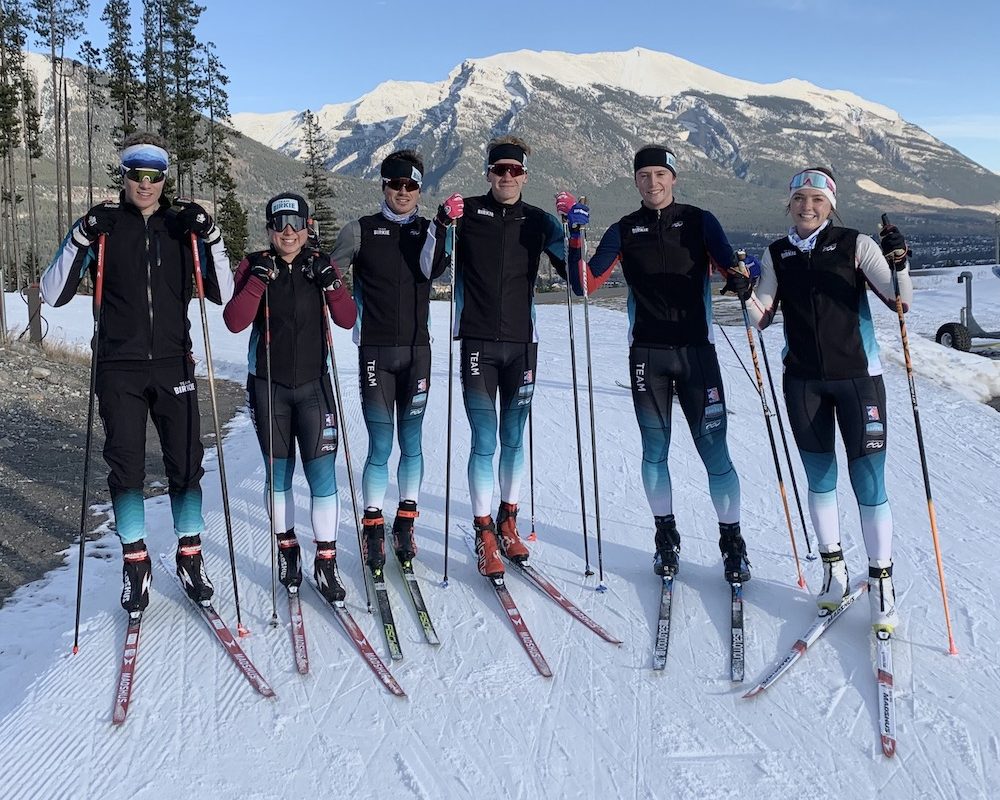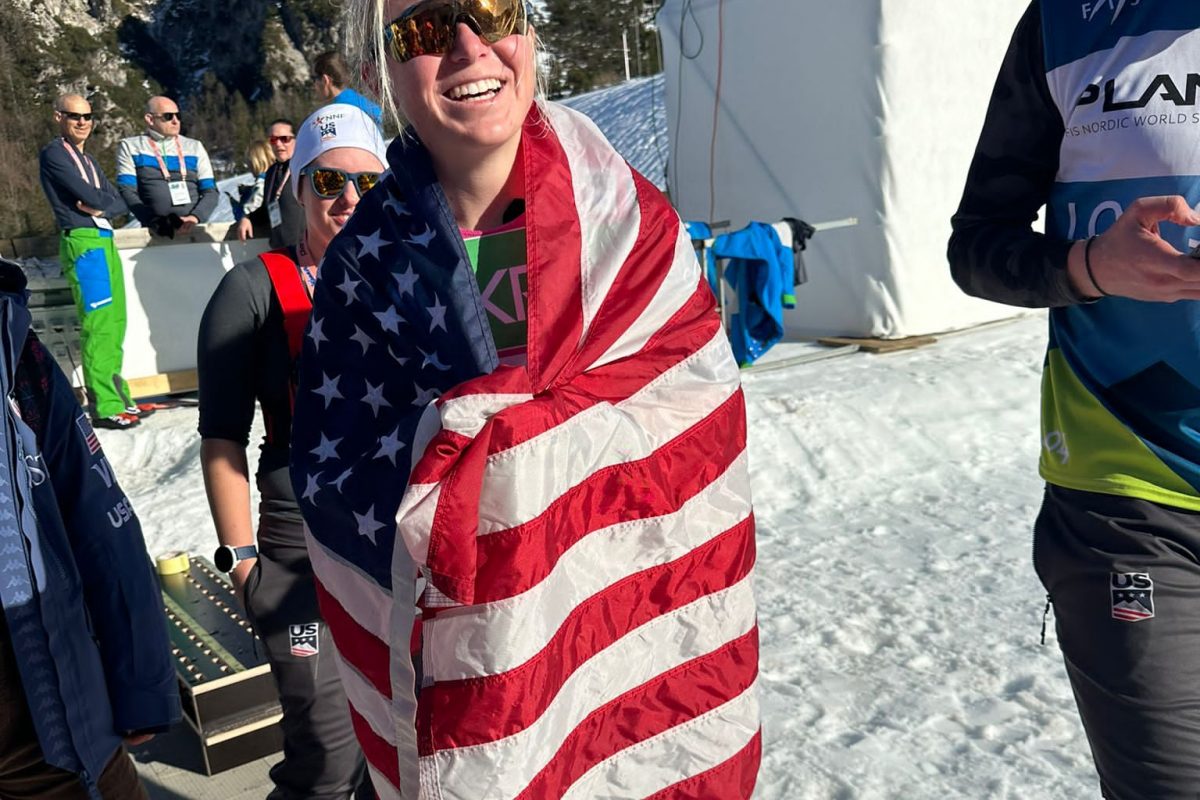 This World Cup coverage is made possible through the generous support of Marty and Kathy Hall and A Hall Mark of Excellence Award. To learn more about A Hall Mark of Excellence Award, or to learn how you can support FasterSkier’s coverage, please contact info@fasterskier.com.
This World Cup coverage is made possible through the generous support of Marty and Kathy Hall and A Hall Mark of Excellence Award. To learn more about A Hall Mark of Excellence Award, or to learn how you can support FasterSkier’s coverage, please contact info@fasterskier.com.
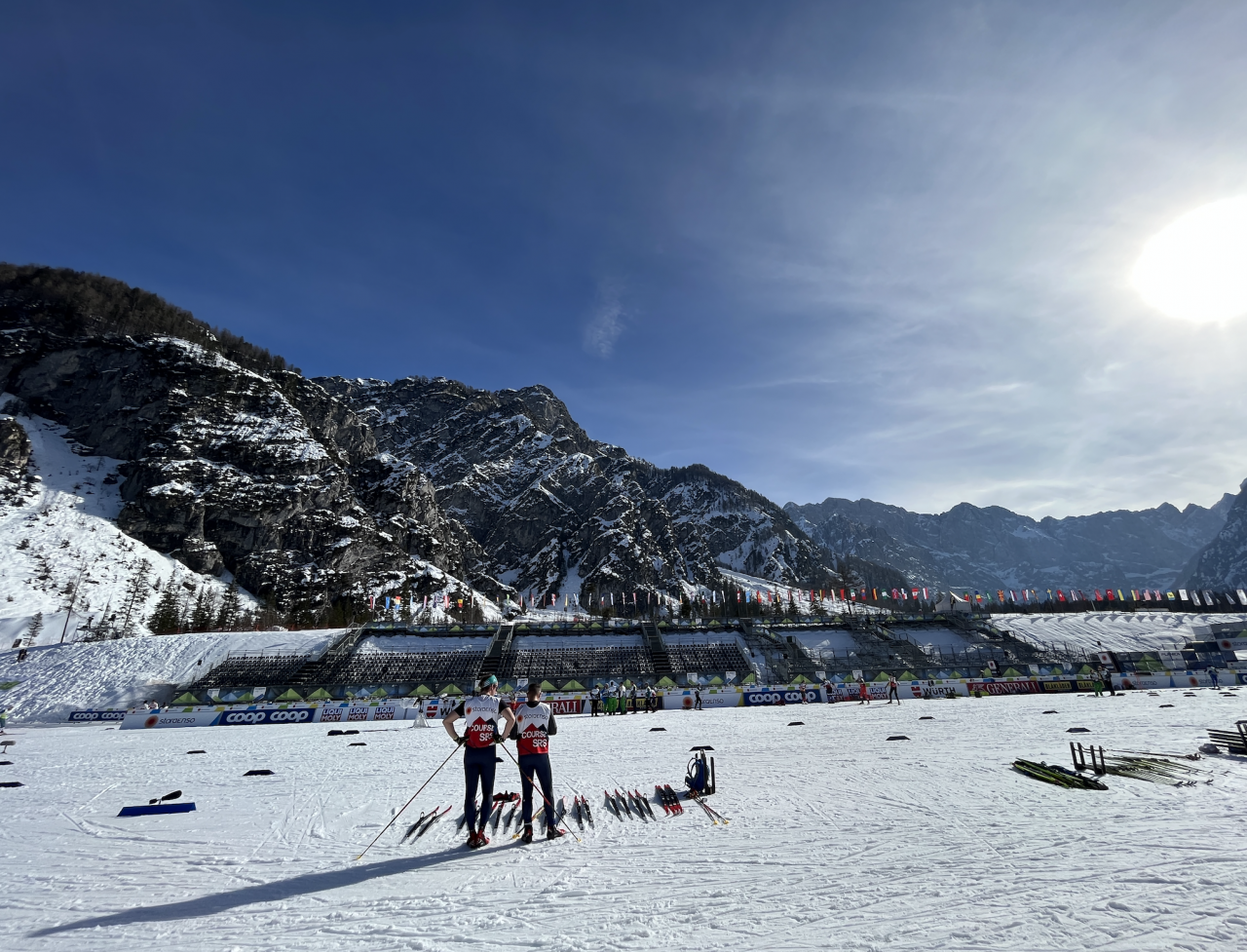
PLANICA, SLOVENIA — What a difference a year makes.
Last February, the world’s top cross-country skiers were in China, hermetically sealed inside the Olympic Covid bubble. When they emerged to race, they braved biting winds, frigid temperatures and dry snow that dragged like sandpaper.
This year’s World Championships, by comparison, set to kick off here Thursday, feel like a beach party.
As athletes trained Wednesday for their first event, a sprint race using the traditional classic technique, they quickly shed their clothing in the 45-degree heat, as the sun rose high above the rocky cliffs hemming in Planica’s competition venue.
The course underwent its own transformation, softening into patches of slush, mush and ice in places that some skiers said could get spicy Thursday, when six athletes at a time will be simultaneously hurtling around corners and risking crashes in hopes of securing a medal.
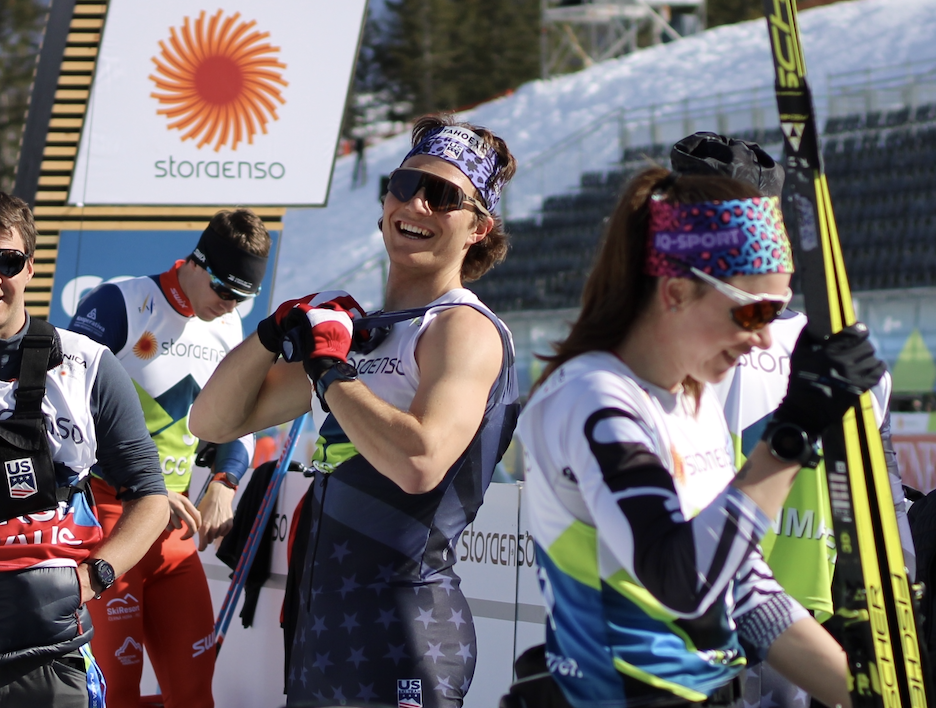
Overall, though, the atmosphere was festive and light, with a small crowd along the finishing stretch bleachers that kept up a steady drone of horns as athletes tested their skis and fitness.
“It’s a pretty sweet vibe,” J.C. Schoonmaker, a U.S. sprinter from Tahoe who will be competing Thursday, said as he left his training session Wednesday. He was shirtless, having stripped down to just a training bib labeled with the name “Ogden,” for his sprint teammate Ben, who had traded garments with Schoonmaker in a nod to the professional football tradition of jersey swapping.
The World Ski Championships will run for 11 days, with golds, silvers and bronzes awarded in six different events for each gender.
The organizers are billing the sporting event as the largest ever for Slovenia, which was part of the socialist federation of Yugoslavia until 1991.
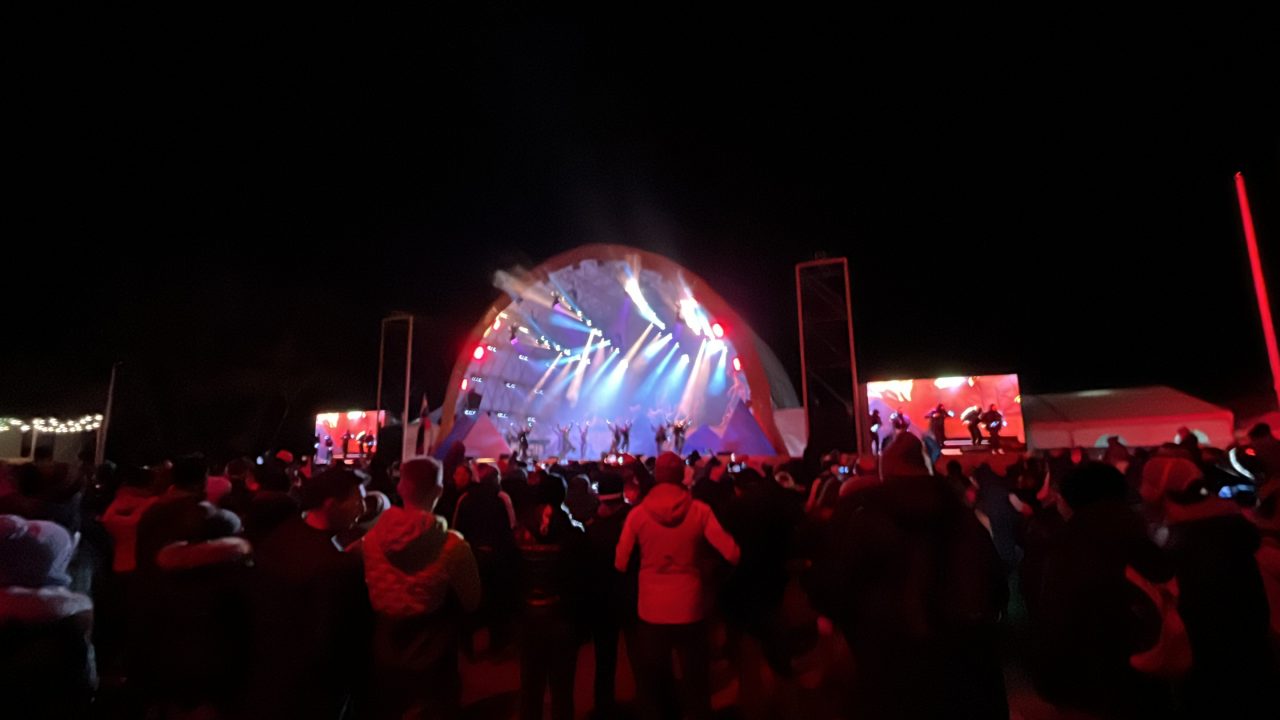
Since then, the nation has produced an array of star athletes, from road cyclists to downhill ski racers and biathletes. And it put its national pride on display in a boisterous opening ceremony Tuesday: It featured hip-hop dancers gyrating behind jets of flame, a star Slovenian disc jockey spinning beats and a modernized rendition of a classic folk song — Oj, Triglav, moj dom, or “Oh, Triglav, my home” — that featured ghostly projections of ski jumpers’ silhouettes and a computer generated eagle, elk and mountain goat.
The ski races themselves will be held in Planica, which isn’t really a town — just a high-level competition venue tucked into one of Slovenia’s most picturesque alpine valleys. Jagged peaks hem in the valley from the west, and teams drive in from the small Slovenian alpine ski resort town of Kranjska Gora, nearby, and from other villages just across the border in Austria and Italy.
There are ski trails all over the area, giving athletes the option to train outside the competition venue — though some have been rendered inaccessible by warm temperatures and a low snowpack, like those near the Canadian hotel in Austria, said Matt Smider, the team’s development coach.
“There were some trails there up until about a week ago, and then they kind of melted out,” he said. “Which is too bad — we were really banking on those.”
There are a few big storylines leading into the championships, which are held every two years.
One is the complete absence of the Russian cross-country ski team, which the International Ski Federation, known as FIS, has banned from competing since the country invaded Ukraine last spring.
That absence has been glaring on cross-country’s World Cup circuit, where its star men and women were regularly on the podium last year.
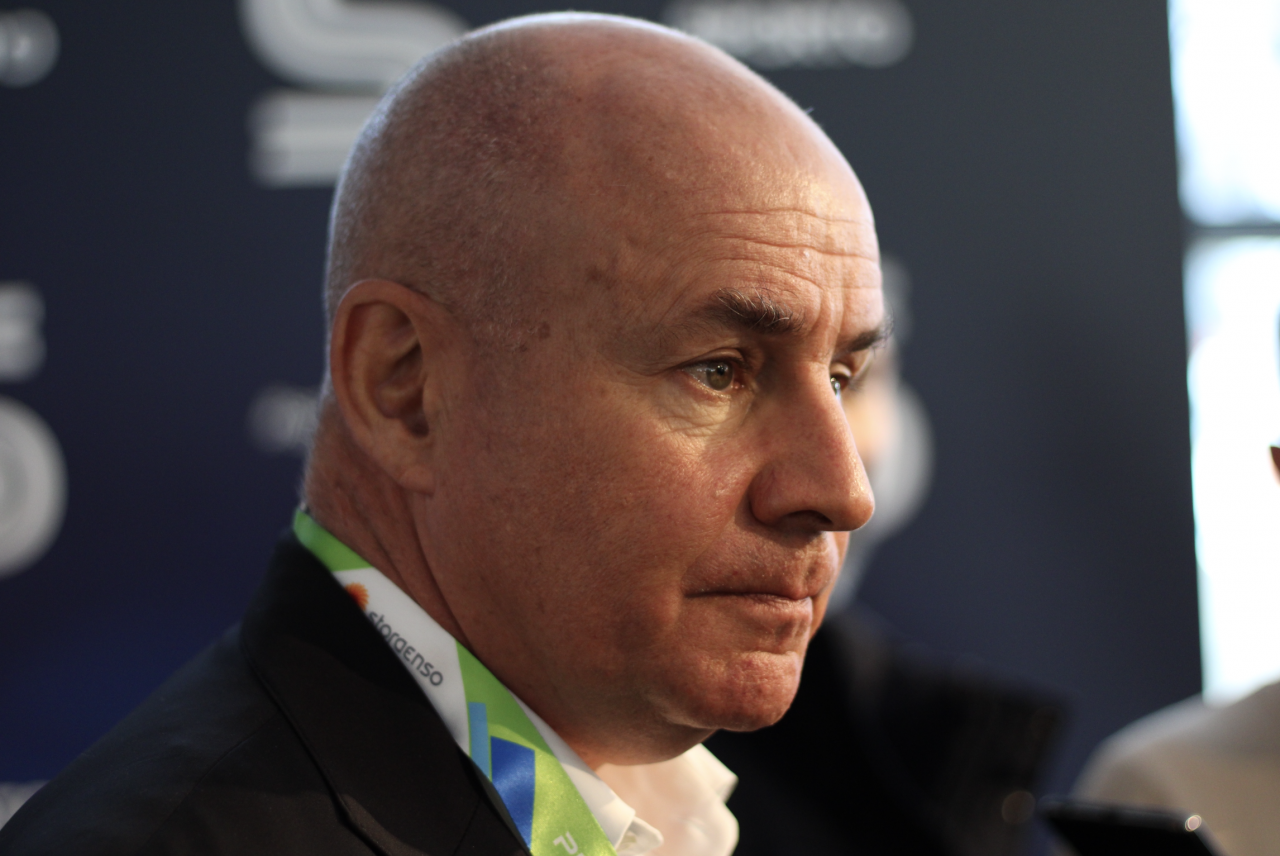
The International Olympic Committee said last month allowing Russians to return to competitions as “neutral athletes” — not representing their home country — should be explored. But 34 national governments, mostly from Europe, to remain excluded from next year’s summer Olympics until and unless the IOC comes up with a “workable” model for neutral participation.
Ukraine has a cross-country team participating in Planica, where their flag-bearer at Tuesday’s opening ceremonies got a warm welcome from the crowd.
FIS President Johan Eliasch, asked by reporters Wednesday about the future of Russia’s participation in federation events, didn’t express a clear position — citing, on the one hand, how “athletes don’t choose where they were born,” and noting the “polarizing and difficult situation” in Ukraine on the other.
He said his organization would likely follow any recommendations that come from the Olympic committee, though it depends on what those recommendations are.
“The one thing we want to avoid here is that we have a divided sports community,” he said. “We have to join together and back up the IOC on their direction.”
Other big stories at the championships revolve around Norway.
Its dominance on the Russia-less World Cup circuit this year has sparked anxiety both inside and outside the country about cross-country skiing’s continued viability as a global sport. Those feelings have already been on stark display in Planica, where retired Slovenian cross-country ski legend Petra Majdic blasted the Norwegians for parking a two-story VIP trailer at the championship venue.
“What the hell is Norway doing? Does Norway need to make smaller skinng nations even smaller?” she asked a reporter for a Norwegian television station. “Fair enough that they can afford to pay 6,000 euros to park here for their sponsors. But cross-country skiing needs now, more than ever, less difference between the nations both sportingly and financially.”
Norway’s male superstar, Johannes Høsflot Klæbo, is the leading candidate to pour cold water on Majdic’s hopes of equitable results in Planica.
Klæbo has won 13 of the 19 races he’s entered this season, and at just 26, he’s already starting to be described as the greatest cross-country skier of all time. His fans are hoping he could win gold in all six events in Planica: four individual races, a team sprint and a relay.
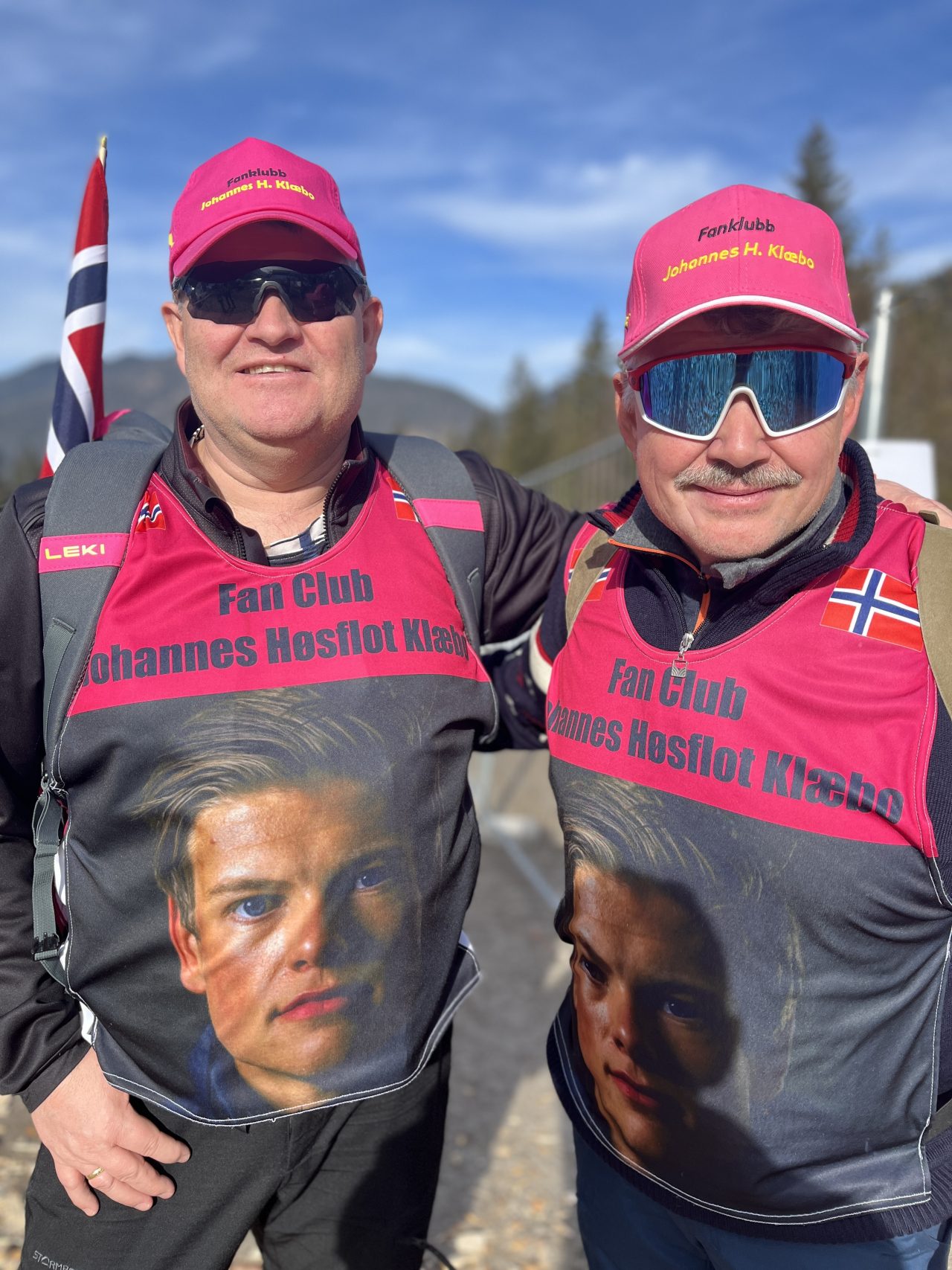
“He’s good enough,” said Hans Tettli, a family friend who was walking around the Planica venue in a Klæbo Fan Club bib — for sale for 40 euros, proceeds going to charity.
The U.S. team in Planica doesn’t quite have Klæbo-esque expectations, but it has two serious medal contenders in its star women, Jessie Diggins and Rosie Brennan. Diggins won a silver and bronze in China last year, while Brennan had an excruciating fourth place in the sprint, sixth place in another individual race, and a fifth, with Diggins, in the team sprint.
“If we have the week that we are capable of — and not even the best week ever — we can win medals,” Head Coach Matt Whitcomb said in a phone interview Wednesday evening.
The U.S. team doesn’t focus on medals, though, Whitcomb added; it focuses on its training and racing process.
“The medals are the compass: They keep us focused on the daily goals and the weekly goals,” he said.
The U.S. athletes held a pre-championships camp in Austria, at a similar, moderate altitude to Planica’s 3,000 feet above sea level; the preparatory program, according to Whitcomb, is something of a test run for the 2026 Olympics in Italy, which will also take place at moderate elevation.
The pressures of the championships are significant, Whitcomb said. But athletes said Wednesday that they’re still finding ways to have fun — namely with playing cards, given the lack of reliable wi-fi at the team’s hotel.
The game of choice, said U.S. distance specialist Gus Schumacher, has been euchre, a game popular in the midwest that pits two teams of two players against each other.
“And hearts,” he said. “We were getting tired of euchre.”
The Americans said they expect that the sprint could get squirrely as the course warms and melts Thursday. Schumacher crashed going down a hill Wednesday, and Schoonmaker, the sprinter, said he’s considering using more supportive boots — pursuit boots — for Thursday’s race.
“The corners are getting really slushy with, just, a sheet of ice on the inside,” he said. “It’s kind of one of those things that could cost you if you slip up at all.”
Nathaniel Herz
Nat Herz is an Alaska-based journalist who moonlights for FasterSkier as an occasional reporter and podcast host. He was FasterSkier's full-time reporter in 2010 and 2011.


